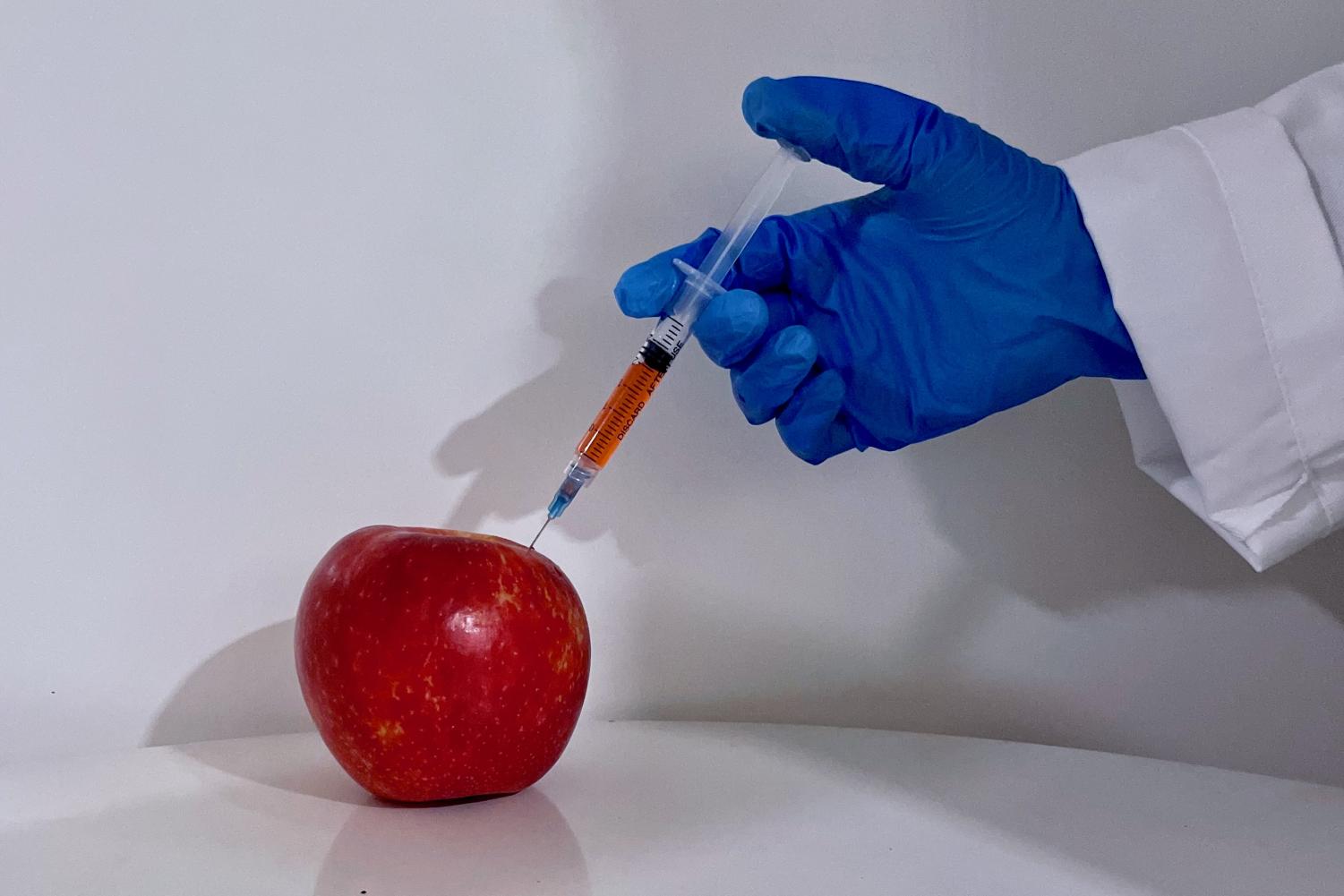You’re cutting up an apple as an afternoon snack in an attempt to eat healthier before putting the slices in a bowl and going to sit down. According to the Environmental Working Group (EWG), as you bite into what is believed to be a healthy snack, you also digest diphenylamine, elevating your risk to develop stomach and esophageal cancers.
Apples, like most other foods, are subject to several different additives. One example is diphenylamine, which is an antioxidant chemical treatment often used to prevent brown or black patches on the skin of apples in cold storage. Although it doesn’t qualify as a food additive, it is approved by the U.S. Food and Drug Association (FDA) and the residue is sometimes ingested. So is that apple truly healthy?
According to Harvard’s The Nutrition Source , every food is processed to a certain degree. There are highly processed foods such as soft drinks and potato chips, but fruits and vegetables, like apples, are processed to a certain extent as well. Apples go through several steps to ensure that they remain as fresh as possible for consumers from getting harvested at farms to when they are eventually eaten.
Dr. Cate Ward is a dietician who works at her own practice and is a postdoctoral fellow at Stanford Medicine.
“I think heavily processing and removing fiber from food can lead to a less healthy diet if one consumes many processed foods throughout the course of the day. However, in moderation, these foods can fit into a healthy diet,” Ward said.
Lariah M. Edwards is an associate research scientist in the Department of Environmental Health Sciences at Columbia University’s Mailman School of Public Health.
Both Ward and Edwards believe that heavily processed foods generally have more additives and a higher likelihood of negative health consequences, but with moderation, they can still be a part of a healthy diet.
“Eating fruits and vegetables is definitely the better choice than eating processed foods because they’re more nutritious for you. They’re just better for your body. So from a purely nutritious standpoint, yes, eating fruits and vegetables, eating fewer processed foods are better for you. However, our country’s chemical policy doesn’t do a very good job of regulating chemicals,” Edwards said.
Apples are just one of the many perceived healthy foods that can have a negative effect on your health due to the additives they have. In fruit processing, common additives used include a number of food additives that are in popular use including preservatives, antioxidants, food colors, flavors, sweeteners, acidulants, hydrocolloids, and enzymes.
“There are chemicals in so many aspects of our environment, our air and water, the products we use, and unfortunately, in the foods that we eat: fruits and vegetables, unprocessed foods … so you will not avoid chemical exposures by eating those foods entirely,” Edwards said.
“Eating fruits and vegetables is definitely the better choice than eating processed foods because they’re more nutritious for you. They’re just better for your body. So from a purely nutritious standpoint, yes, eating fruits and vegetables, eating fewer processed foods are better for you. However, our country’s chemical policy doesn’t do a very good job of regulating chemicals,” Edwards said.
As of right now, there are more than 10,000 different additives that have been approved by the FDA and can be found in foods we eat every day. Roughly 3,000 of these additives are widely considered safe. Many of them are common, everyday ingredients such as salt and sugar that don’t have any proven harmful health impacts as long as they are eaten in moderation. However, that leaves 7,000 additives on the list, some having negative effects on health.
If these foods are dangerous, then how are they passed by the FDA? According to Consumer Reports , one of the primary reasons that many detrimental ingredients can be in our foods is due to a rule created by the FDA allowing companies to add ingredients to food with minimal government surveillance. This loophole of additives can be “generally recognized as safe” (GRAS), was established in 1958, and has since allowed for thousands of different ingredients to be allowed in various foods.
The original intent of GRAS was for manufacturers of common ingredients such as vinegar to circumvent the extensive safety review process. This process was estimated to take an average of two years per review, with some extending as long as decades.
But one of the most prominent concerns with this policy is that companies are introducing additives without the knowledge of the FDA and, therefore, without the review of regulators who ensure there are no immediate health impacts or long-term effects.
There have been thousands of complaints and criticism by both watchdog groups and the general public regarding guidelines and the health detriments of some of the additives. Michael Taylor, the FDA’s deputy commissioner for foods publicly acknowledged the drawbacks. GRAS additives that have been implemented in foods for decades are now being challenged by new scientific research that questions their safety. The biggest concern of critics of the GRAS system is that of the additives that the public is unaware of.
The range of different additives is extensive, and the list of foods they can be found in is even bigger. Ingredients are added to foods for one of three reasons. To maintain or improve safety and freshness, to improve or maintain nutritional value, or to improve the taste, smell or appearance.
Ultimately, additives are meant to enhance foods in a variety of ways and make consumers more inclined to buy them.
According to a Pew Research poll of public perspectives on food risks, 48% of people believe that the average person is exposed to additives in the food they eat every day, but they are in such small amounts that this does not pose a serious health risk.
“I let the experts who conduct toxicity studies and study food safety determine what is “safe” in our food,” Ward said.
Food additives are an ever-growing industry. According to Grand View Research, as of 2020, the global food additives market was valued at $98 billion. It was projected to only improve at a compound annual growth rate (CAGR) of 5.5% in 2020-2028. This increase is directly linked to the state of the food and drink industry, which is also a booming economy.
Despite there being additives in many different foods that we eat daily, there are still preventative measures that can be taken to try and avoid them.
Vici Thahir is a food scientist who is working at a biotechnology company called Air Protein.
“Just look at the label of the things before buying at the grocery stores. I think just be mindful before buying things when you’re at grocery stores,” Thahir said.
More specifically in regards to fruit, “there are some measures you can take as a consumer to steer away from all the additives, sometimes, with higher cost, you can get higher quality and I know that when foods are organic they are usually better,” Thahir said.
However, even with taking preventative measures, there is little you can do to fully reduce your intake of additives with negative effects.
“There’s no one clear message to give people in terms of how to entirely avoid contaminants in your food,” Edwards said. “But I’d love to see a day when we have the regulatory power to ensure that everybody has access to foods that are free of contaminants, whether it’s an apple or a burger from a fast food joint.”



